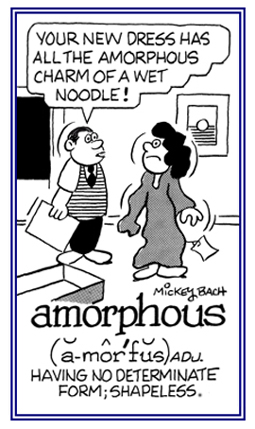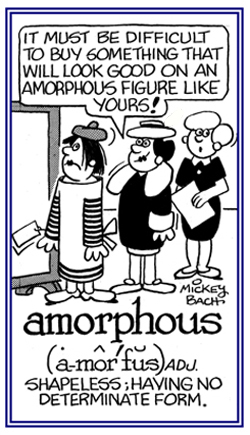-ous, -ious, -eous
(Latin: full of or having the qualities of; in chemistry, a suffix denoting that the element indicated by the name bearing it, has a valence lower than that denoted by the termination -ic; as, nitrous, sulphurous, etc., as contrasted with nitric, sulphuric, etc.)
Only a small number of the hundreds of examples are presented because there are just too many to include at this time.
2. Abounding with, or like, seaweed.
2. Not belonging to a particular type or pattern: Toby's amorphous commitment to regularly paid employment was difficult to understand.
3. Of no particular kind or character; indeterminate; having no pattern or structure; unorganized: Kari has an amorphous style of writing; as well as, an amorphous personality.
4. In petrology, a mineral occurring in a mass, as without stratification, form, or crystalline structure: The amorphous layer of sand was mixed with an unidentified hard substance which made drilling for natural gas difficult.


Go to this Word A Day Revisited Index
for a list of additional Mickey Bach illustrations.
2. Migrating from fresh to salt water or from salt to fresh water at some stage of the life cycle other than the breeding period.
2. Fish; such as, salmon and shad that return from the sea to the rivers where they were born in order to breed.
The best-known anadromous fish are salmon, which hatch in small freshwater streams, go down to the sea and dwell there for several years, then return to the same streams where they were hatched, spawn, and then die shortly thereafter.
2. A reference to that which appears to be related or alike in some aspects: Wings of many flying animals or insects are analogous to each other in function, but definitely not in structure; such as, the wings of an insect and the wings of a bird.

Go to this Word A Day Revisited Index
so you can see more of Mickey Bach's cartoons.
2. Attended with, showing, or causing anxiety: "She spent an anxious night waiting for the test results."
3. Full of mental distress or uneasiness because of fear of danger or misfortune; greatly worried; solicitous: "Her parents were anxious about her poor health."
4. Earnestly desirous; eager (usually followed by an infinitive or for): "They were anxious to please"; "They were anxious for our happiness."
5. Attended with or showing solicitude or uneasiness: "He had anxious forebodings about going on the trip."
Anxious has a long history of use roughly as a synonym for eager, but many prefer that anxious be used only when its subject is worried or uneasy about an anticipated event.
Anxious and eager are somewhat analogous in meaning but careful speakers and writers use anxious when some doubt or worry exists; as, "She is anxious because the plane is long overdue." It is eager when the mood is one of joyous anticipation: "I am eager to hear the awards announced."
2. Botany, having no winglike parts or extensions: When Joe planned his garden, he included many apterous plants which would not disseminate their seeds with winglike structures.


